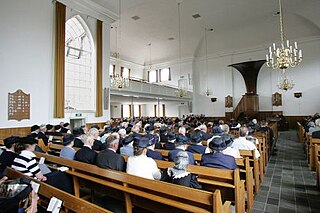"Unchurched" (alternatively, "The Unchurched" or "unchurched people") means, in the broad sense, people who are Christians but not connected with a church. [1]
The term is not well-defined; different people understand it differently. In research on religious participation, it refers more specifically to people who do not attend worship services. [2] In this sense it differs slightly from the term 'nones' which denotes an absence of affiliation with a religion and not an absence of attendance at religious services. The word will normally be used to describe a person who has come from a Christian background, but is no longer connected to a religious group. The Barna Group defines the term to mean "an adult (18 or older) who has not attended a Christian church service within the past six months" excluding special services such as Easter, Christmas, weddings or funerals. [3] Edward L. Ericson, a former member of the Joint Washington Office for Social Concerns, defines "unchurched" as anyone who refuses to join a religious organization "out of principle". [4]
Throughout history the word "unchurched" was a derogatory reference to people lacking access to culture or education or referred to inappropriate, improper or impolite behavior. It is no longer used this way.
It was estimated that there were 130 million "unchurched people" in the US in 2021. [5]
Religion is a range of social-cultural systems, including designated behaviors and practices, morals, beliefs, worldviews, texts, sanctified places, prophecies, ethics, or organizations, that generally relate humanity to supernatural, transcendental, and spiritual elements—although there is no scholarly consensus over what precisely constitutes a religion. Different religions may or may not contain various elements ranging from the divine, sacredness, faith, and a supernatural being or beings.
In Christian belief, a saint is a person who is recognized as having an exceptional degree of holiness, likeness, or closeness to God. However, the use of the term saint depends on the context and denomination. In Anglican, Oriental Orthodox, and Lutheran doctrine, all of their faithful deceased in Heaven are considered to be saints, but a selected few are considered worthy of greater honor or emulation. Official ecclesiastical recognition, and veneration, is conferred on some denominational saints through the process of canonization in the Catholic Church or glorification in the Eastern Orthodox Church after their approval. In many Protestant denominations saint refers broadly to any holy Christian, without special recognition or selection.

Worship is an act of religious devotion usually directed towards a deity or God. For many, worship is not about an emotion, it is more about a recognition of a God. An act of worship may be performed individually, in an informal or formal group, or by a designated leader. Such acts may involve honoring.

Liturgy is the customary public ritual of worship performed by a religious group. As a religious phenomenon, liturgy represents a communal response to and participation in the sacred through activities reflecting praise, thanksgiving, remembrance, supplication, or repentance. It forms a basis for establishing a relationship with God.
Secularity, also the secular or secularness, is the state of being unrelated or neutral in regards to religion. The origins of secularity can be traced to the Bible itself. The concept was fleshed out through Christian history into the modern era. In the Middle Ages, there were even secular clergy. Furthermore, secular and religious entities were not separated in the medieval period, but coexisted and interacted naturally. The word secular has a meaning very similar to profane as used in a religious context.

The Oxford English Dictionary defines religiosity as: "Religiousness; religious feeling or belief. [...] Affected or excessive religiousness". Different scholars have seen this concept as broadly about religious orientations and degrees of involvement or commitment. The contrast between "religious" and "religiose" and the concept of "strengthening" faith suggest differences in the intensity of religiosity.

A place of worship is a specially designed structure or space where individuals or a group of people such as a congregation come to perform acts of devotion, veneration, or religious study. A building constructed or used for this purpose is sometimes called a house of worship. Temples, churches, mosques, and synagogues are examples of structures created for worship. A monastery may serve both to house those belonging to religious orders and as a place of worship for visitors. Natural or topographical features may also serve as places of worship, and are considered holy or sacrosanct in some religions; the rituals associated with the Ganges river are an example in Hinduism.
A Protestant or Evangelical youth ministry is a Christian ministry aimed towards young people through the lens of Protestant or Evangelical traditions. Focuses may include the instruction of youths in what it means to be a Christian, how to mature as a Christian, and how to evangelize others through apologetics. Youth ministries may vary widely depending on their denomination, size, liberal or conservative outlook and geographic location.

The mainline Protestant churches are a group of Protestant denominations in the United States and Canada largely of the theologically liberal or theologically progressive persuasion that contrast in history and practice with the largely theologically conservative evangelical, fundamentalist, charismatic, confessional, Confessing Movement, historically Black church, and Global South Protestant denominations and congregations. Some make a distinction between "mainline" and "oldline", with the former referring only to denominational ties and the latter referring to church lineage, prestige and influence. However, this distinction has largely been lost to history and the terms are now nearly synonymous.
A house church or home church is a label used to describe a group of Christians who regularly gather for worship in private homes. The group may be part of a larger Christian body, such as a parish, but some have been independent groups that see the house church as the primary form of Christian community.

In Christianity, a minister is a person authorised by a church or other religious organization to perform functions such as teaching of beliefs; leading services such as weddings, baptisms or funerals; or otherwise providing spiritual guidance to the community. The term is taken from Latin minister. In some church traditions the term is usually used for people who have been ordained, but in other traditions it can also be used for non-ordained.
McChurch is a McWord used to suggest that a particular church has a strong element of entertainment, consumerism or commercialism which obscures its religious aspects. The term is sometimes used as a derogatory synonym for megachurch.

A church is a religious organization or congregation that meets in a particular location, often for worship. Many are formally organized, with constitutions and by-laws, maintain offices, are served by clergy or lay leaders, and, in nations where this is permissible, often seek non-profit corporate status.

Catechesis is basic Christian religious education of children and adults, often from a catechism book. It started as education of converts to Christianity, but as the religion became institutionalized, catechesis was used for education of members who had been baptized as infants. As defined in the Catechism of the Catholic Church, paragraph 5 :
Catechesis is an education in the faith of children, young people and adults which includes especially the teaching of Christian doctrine imparted, generally speaking, in an organic and systematic way, with a view to initiating the hearers into the fullness of Christian life.
This is a glossary of spirituality-related terms. Spirituality is closely linked to religion.
The terms internet church, online church, cyberchurch, and digital church refer to a wide variety of ways that Christian religious groups can use the internet to facilitate their religious activities, particularly prayer, discussion, preaching and worship services. The internet has become a site for religious experience which has raised questions related to ecclesiology.
The Barna Group is an evangelical Christian polling firm based in Ventura, California.
In the United States, between 6% and 11% of the population demonstrated nonreligious attitudes and naturalistic worldviews, namely atheists or agnostics. 24% of people who do not believe in God or a universal spirit call themselves atheists. Other given answers are: "Nothing in particular", "Agnostics", "Christians", "Jewish", "Buddhists", "Other religions" and "Don't know/Refused". Atheists are between 4% and 7% of American adults. Agnostics make up between 4 and 5% of the adult population.

Church attendance is a central religious practice for many Christians; some Christian denominations require church attendance on the Lord's Day (Sunday). The Canon Law of the Catholic Church states, "on Sundays and other holy days of obligation, the faithful are bound to participate in the Mass". The Westminster Confession of Faith is held by the Reformed Churches and teaches first-day Sabbatarianism and the duty of church attendance on this day. Similarly, the General Rules of the Methodist Church also requires "attending upon all the ordinances of God" including "the public worship of God". The Lutheran Christian theologian Balthasar Münter stated that church attendance is the "foundation for the Christian life" as "the Christian Bible and the sacraments provide the framework for the faith"; he also states that it is important for believers because it aids in the prevention of backsliding, as well as offers "the company of other believers". Until 1791, it was a legal requirement in the Kingdom of Great Britain to attend services of the Church of England at least twice a year.
Religious identity is a specific type of identity formation. Particularly, it is the sense of group membership to a religion and the importance of this group membership as it pertains to one's self-concept. Religious identity is not necessarily the same as religiousness or religiosity. Although these three terms share a commonality, religiousness and religiosity refer to both the value of religious group membership as well as participation in religious events. Religious identity, on the other hand, refers specifically to religious group membership regardless of religious activity or participation.